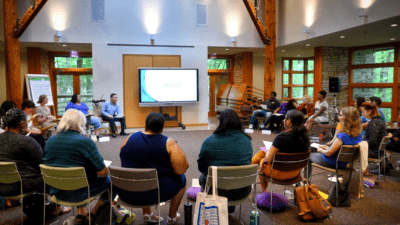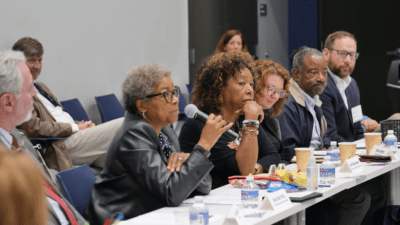On Sept. 29, W.K. Kellogg Foundation (WKKF) President and CEO La June Montgomery Tabron joined a conversation hosted by the University of Chicago’s Rustandy Center for Social Sector Innovation at the Booth School for Business – the first panel in a series examining what philanthropy and the private sectors could do more of to achieve meaningful change.
She was joined by moderator Julia Stasch, immediate past president of the John D. and Catherine T. MacArthur Foundation and philanthropy executive in residence at the Rustandy Center; John Palfrey, the current president of the MacArthur Foundation; and Tom Tierney, chairman and co-founder of Bridgespan Group.
Overall panelists agreed that philanthropy – both individual and institutional – plays an important and often innovative role in supporting efforts to advance racial and social equity. This role is especially relevant as communities navigate the impacts of a global pandemic, resulting economic challenges and social unrest sparked by systemic racism.
Now, more than ever, they said, philanthropy is being asked to act, respond and collaborate in new ways.
“You have to be careful with a fully baked theory of change going into community, if you really believe the answer is within community.”
- La June Montgomery Tabron
To act on that understanding, Tabron shared insights from WKKF’s perspective, including these:
- Agility and strong community connections are essential. Foundations and donors may be tempted to rely heavily on external research, rigorous processes or fully baked, complex theories of change when working with people trying to create change on the ground. The Kellogg Foundation relies upon something simpler: the way to make lasting change in community is by planning cooperatively, infusing the knowledge from those involved and then acting together. “The people who actually aspire for change, actually create the change that happens. That is what sustainability looks like,” says Tabron.
- Make 95% of your portfolio work just as hard as your 5% payout. All private, non-operating foundations in the U.S. are required by law to distribute 5% of the value of their net investment assets annually – primarily happening through grantmaking. In a time when philanthropy is being asked to act, respond and collaborate in new ways, the Kellogg Foundation is using several approaches to create change beyond grantmaking alone. This includes impact investing – while prioritizing relationships with women and managers of color; working alongside financial services to support internal transformations related to racial equity, diversity and inclusion; supporting entrepreneurs of color through funds that make capital more accessible; and sharing WKKF’s racial equity, diversity and inclusion journey with others. Finally, WKKF is increasing its typical 5% payout by $300 million over two years, to address critical needs of children, families and communities in the wake of the global pandemic, as well as urgent issues of racial injustice. Advancing racial equity and social change efforts requires not just WKKF’s money, but “our leverage, our influence and our leadership to make systemic changes across the nation and the world,” says Tabron.
Watch the full panel discussion or read the Booth School’s summary.








Comments